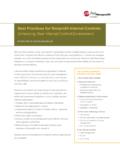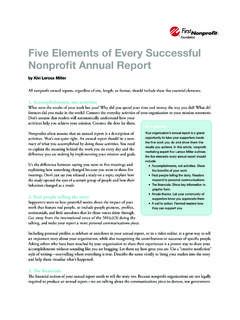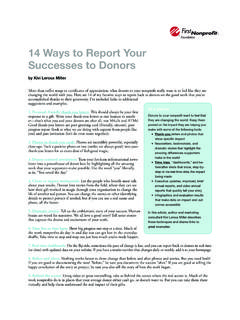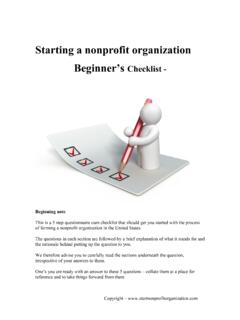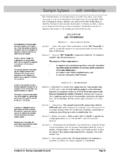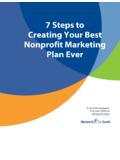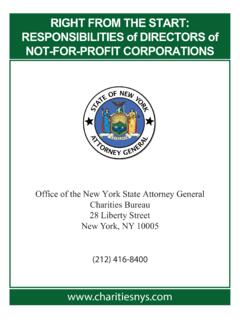Transcription of EVERY BOARD MEMBER NEEDS TO KNOW Essential Keys to
1 10. THINGS. EVERY . BOARD MEMBER . NEEDS . TO know . Essential Keys to Nonprofit Finance by James R. Thomas, JD, CPA, John J. Quinn, CPA, Thomas G. Andrews, CPA, and Melissa E. Struck, CPA. Mission Our mission is to foster effective risk management practices and the overall development and advancement of nonprofits through unique, creative initiatives. Ten Things Series for Nonprofit Boards Welcome to this series of short briefing papers for nonprofit BOARD members . Whether a seasoned leader or first-time trustee, there is a continual need to revisit the expectations and demands of the critical BOARD MEMBER roles in steering, supporting and safeguarding nonprofit organizations.
2 In this series, First Nonprofit Foundation has identified topics of particular interest to BOARD members and will provide digests of time-tested wisdom, emerging thought, and the insights of highly experienced practitioners. We trust these papers will succeed in helping nonprofits to develop and advance. As always, we welcome your comments and suggestions. Booklets in this series Advancing Together: The Role of the Nonprofit BOARD in Successful Strategic Alliances A Winning BOARD : Steps That Bring Out the Best Champions with a Cause: The Nonprofit BOARD MEMBER 's Role in Marketing Strong Partners: Building an Excellent Working Relationship between the Nonprofit BOARD and its Chief Executive Evaluating the Executive Director: Your Role as a BOARD MEMBER Finding the Opportunity in Economic Chaos Fundraising: A Partnership between BOARD and Staff Essential Keys to Nonprofit Finance Risk Management: Your Role as a BOARD MEMBER Shaping the Future.
3 The BOARD MEMBER 's Role in Nonprofit Strategic Planning Sustaining Great Leadership: Succession Planning for Nonprofit Organizations We haven't got the money, so we have to think! Nobel laureate Ernest Rutherford 1. The quote we haven't got the money, so we have to think describes the condition of almost EVERY nonprofit. As leaders and fiduciary guardians of their organizations, BOARD members must learn to think, and think hard, about the finances of their organization. The good news is that though this responsibility is daunting, the right preparation enables even the financially unsophisticated BOARD MEMBER to effec- tively oversee the organization's finance function.
4 This booklet identifies and describes ten things your BOARD should know about an organization's finance function. The list is not all-inclusive and is not intended to establish a general standard of operation, but we hope it will generate productive discussion on the BOARD and with management. These ten things are: 1. Reading Internal Financial Statements 2. Understanding Budgets and Forecasts 3. Understanding Your Sources of Revenue 4. Understanding Fiscal Year-End Financial Statements 5. The External Audit Process 6. Executive Compensation 7. Internal Controls Fraud Prevention and Detection 8.
5 Accounting Procedures and Policies Manuals 9. Annual Tax Filings 10. Other Financial Reporting 1. Reading Internal Financial Statements BOARD members ' responsibility includes reviewing financial information and making decisions in the best interest of the organization. To fulfill this duty, management typically supplies reports on a schedule that fits with BOARD meetings. This financial information may be used by BOARD members to: 1. Monitor revenue, support, and expenses, and compare results to prior periods or to budgeted amounts. 2. Assess the financial condition of the organization to determine if it is appropriate to expand or contract programs and services.
6 3. Determine whether additional fundraising events or activities are needed to fill the gaps from shortfalls in revenue. 4. Analyze the results of a particular program, activity, or grant. 5. Determine management's ability to use funds effectively to meet the organiza- tion's mission. BOARD members must determine the type and form of financial information they need and require management to provide it on a timely basis usually within 20. days of the most current reporting period. Internal financial statements typically do 2. not consist of a complete set of financial statements. Common statements include the Statement of Financial Position and the Statement of Activities.
7 These are typically unaudited. They help create a complete picture of the organization's financial condi- tion and status of resources that are available for use. The BOARD should plan meetings shortly after the receipt of financial reports in order to make timely decisions in the best interest of the organization. BOARD members should review the reports prior to meeting and prepare questions such as: What are the components of an account? How does this compare to last year's performance, and why? Why are there variances in the actual versus budgeted numbers? Management should be prepared to address these questions and should consider pro- viding a narrative to the BOARD when submitting the internal financial statements to explain conditions and variations.
8 This analysis may also assist in identifying errors that require adjustments on the financial statements. Timely monitoring of financial results is especially important if the organization is experiencing cash flow problems. If different reports and accounting methods are used on an interim basis than used on the year-end financial statements, the BOARD should be educated on the differ- ences and the reasons for the variations in reporting. In addition, the BOARD should 1. Reading Internal Financial Statements obtain an understanding of any adjustments that are needed in order prepare year- end financial statements in accordance with Generally Accepted Accounting Prin- ciples (GAAP).
9 A significant number of adjustments or large dollar adjustments to the internal financial statement at year end may indicate that the statements the BOARD has been receiving are not very reliable. The BOARD should monitor this on an ongoing basis to determine if further action is warranted. 2. Understanding Budgets and Forecasts The budget is a financial plan that serves as a guide for month-to-month operations. It is a roadmap that tells where an organization has been, where it is going, and how it is expected to reach its goals from a financial perspective. The budget is a financial expression of the short- and long-term goals of the organization.
10 It is also a financial control that sets spending limits and attempts to keep costs in line with revenues. Budgets are connected to the availability and timing of financial resources. Cash forecasts project when cash will be received and when it will be disbursed. Thus the forecast is Essential to understanding whether the cash necessary to carry out the 3. plan will be available. Budgets and forecasts go hand-in-hand. BOARD members should understand the budget and forecast process. They should be directly involved with approving the budget and cash forecast; monitoring actual to budgeted results; and approving actions taken when budget revisions are required.


